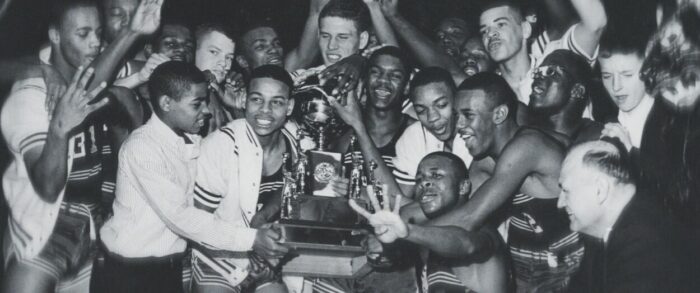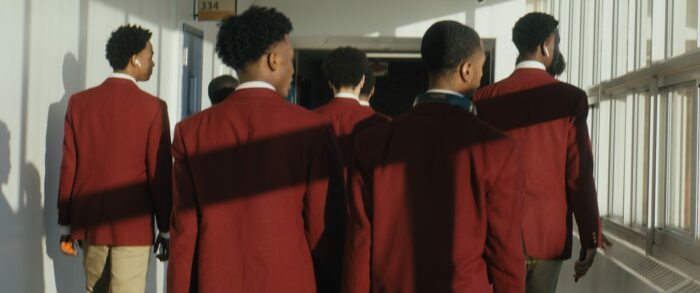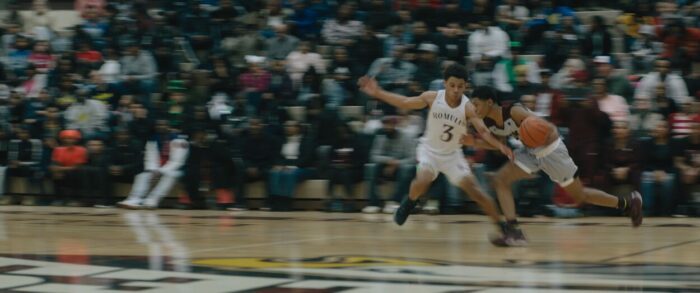The young men of River Rouge High School—in particular those on its varsity basketball team—grow up in the shadow of a complex and honored legacy. Their small town of River Rouge, today just some 7,000 in population and half the size of its post-WWII peak, sits downriver of Detroit. Heavily industrialized and nearly half black, little River Rouge was known as the gateway to American’s rust-belt industrial revolution; it was there that the legendarily ill-fated SS Edmund Fitzgerald was constructed in 1958 at the peak of its production power, back when the town was economically thriving.
Also thriving in River Rouge in the 1950s was its now-legendary boys’ basketball team. Starting in the era when the town’s population was double that it is now and significantly more racially diverse, River Rouge High School ruled the courts. Its dynasty equaled any in America. Coach Lofton Greene led its then-racially integrated teams—at the time an absolute outlier among the predominantly all-white or all-black schools against which it competed—to a stunning 12 state titles between 1954 and 1972, including back-to-back wins in 1954-55, five straight from 1961-65, and four straight from 1969-72. Decades later, the team went on to earn another pair of back-to-back championships in 1998-99. The program never generated any NBA stars—it was always, under Coach Greene’s influence, more about the sacrifice of the individual talent to the greater good of the team’s success—but its players could ball: many of them went on to successful college careers.

As producer-director Hamoody Jaafar tells the story in his new documentary Rouge, the RRHS Panthers’ success was one that bore the stamp of its coach’s imprimatur: Coach Greene was a man who spoke few words but communicated volumes and always put the success of the team, even despite the racial vitriol they often faced, above all. His players learned to lead and to win: they also learned to collaborate and succeed with players who did not share their racial heritage or cultural background. For them, basketball was not just a game played on a hardwood gymnasium floor but a classroom where they learned to navigate the challenges they would face off the court.
As Rouge begins, following the RRHS team as they begin the 2019-20 season, Coach Greene and the Panthers’ legacy of success looms large. The Panthers now play in a new school gymnasium, their old one abandoned, and under a new coach, LaMonta Stone, himself a former Panther, as they seek an elusive 15th State Championship—one that has eluded them for two and a half decades, the longest such stretch since the heyday of Coach Greene’s teams.
While it will necessarily use some traditionally expository techniques—archival footage, legacy interviews, lower-thirds chyrons, and on-screen narration—to convey the program’s rich history, Rouge keeps these documentary tropes to a minimum, opting instead for a primarily verité approach, following Coach Stone and his players closely from their academics to the practice court to tip-off and through several big games. The minimalist approach works well to convey Rouge’s coming-of-age story as the student-athletes face challenges on and off the court and hope to earn college offers that will take them away from their struggling hometown.

Rouge focuses mostly on seniors Brent Darby Jr.—whose father was a State Champ on the 1998-99 teams and played at Ohio State and professionally overseas before tragedy struck—and Ahmoni Weston and junior Legend Geeter as they strive to bring the championship trophy back to River Rouge after its decade-long absence. Today, River Rouge is no longer a racially-integrated team. Much of the town’s white population migrated away over the decades as its industrial production and economic boom waned. For the young men who play there now, basketball is one way out of a town that seems to offer few pathways to an economically productive future.
Also in the way of that elusive 15th State Championship: fierce competition. The Panthers are good, but a few other schools are their apparent equals. Rouge’s coverage of the Panthers’ basketball games is limited, largely, to a single camera perspective on the bench and in the huddle, yet still manages to convey the sport’s physicality and intensity. There’s next to no wide-shot television-style coverage, no voice-over narration, no graphics or other data listing high scorers or rosters—just the game itself, all hustle, bustle, shoot, and score.

Rouge‘s documentation of the team’s rich legacy feels a little less immediate, but it’s no less crucial. Only a little footage of the RRHS team’s mid-century success exists, and what is present in Rouge is extant primarily to give viewers a sense of how the high school game looked some six decades or so ago, when it was played entirely, as they say, “below the rim.” Coach Greene himself is on camera just once or twice in very brief one-sentence interviews from tournament tv coverage: he passed away in 2003 at age 84. That Rouge‘s subject is high school basketball, a sport that is only rarely televised (in comparison to professional sports) and with a significant portion of its history in the distant past, makes telling its story a challenge.
That, though, is the very nature of documentary: to link the present to the past, to examine what how groups and individuals confront their histories and forge onwards. Its making is itself a challenge, both in conveying the past and in documenting the present. Rouge‘s is a story of unparalleled accomplishment and inter-racial collaboration. The team’s current players may be challenged by the past, but an uncertain future awaits them as well. And as a documentary, Rouge may appeal most directly to Michiganders with some familiarity with the River Rouge program’s rich legacy, but its story nonetheless conveys the hoop dreams of those who live—and play—there today, even continuing to fight for that one more elusive state championship.




